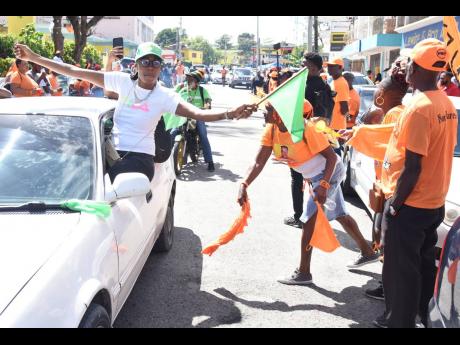SLIM LEAD
Poll indicates tight municipal races with both parties within margin of error
Just days before the majority of the island’s electors get a chance to cast ballots in the long-overdue local government elections, Jamaica’s two main political parties remain in a dogfight. The battle for the 228 divisions and a single mayorship...
Just days before the majority of the island’s electors get a chance to cast ballots in the long-overdue local government elections, Jamaica’s two main political parties remain in a dogfight.
The battle for the 228 divisions and a single mayorship across 14 municipal corporations remains close, three months after a national survey produced a similar finding.
The Jamaica Labour Party (JLP) continues to hold a one-percentage-point lead over the People’s National Party (PNP), with 24 per cent of the 1,010 registered voters surveyed in the latest RJRGLEANER Communications Group-commissioned Don Anderson poll declaring their support for the governing party.
Twenty-three per cent of participants say they will vote for the opposition PNP, while only one per cent of the participants registered their intent to vote for independent candidates.
The participants who said that they harbour no thoughts of voting and those who remain unsure amounted to 26 per cent each.
The findings come ahead of Monday’s election day, which was preceded yesterday by early voting by members of the security forces and election day workers.
The poll was conducted between February 2 and February 7, 2024, and has a sampling error of plus or minus three per cent at the 95 per cent confidence level.
“Based on what people say they are going to do, it will be a close election. Three months ago, when we last did this poll, the Jamaica Labour Party had a one-percentage-point lead. When we did this two weeks ago, the JLP had a one-percentage-point lead. Both of them are within the margin of error of three per cent,” Anderson noted.
The pollster said that both parties appear to have recognised the possibility of a close election, given the level of campaigning being done. He said that it has been significantly more than what would usually obtain for any other local government election in recent memory.
Coming just over a year before the general election, constitutionally due in September 2025, Anderson said that Monday’s polls are a measuring rod of what that outcome could be.
“Especially because we are closer to the next general than we are from the previous general,” he said.
GENDER PREFERENCES
Anderson told The Gleaner that the poll results show that men had a preference for the PNP, while women favoured the JLP.
The veteran pollster said of the men who indicated that they would vote, 26 per cent said that they would vote for the opposition party, while for the women, 24 per cent said that they would vote for the JLP.
Younger people, up to the age of 44, Anderson said, are more inclined to vote for the JLP, with the biggest gap between the two parties showing in the 35 to 44 age group.
He said that for this cohort, 27 per cent indicated that they would vote for the JLP, while 20 per cent said that they would cast ballots for the PNP.
Of note, Anderson said, is that within the 25 to 34 age group, which generally tends to support the JLP, the gap is one percentage point.
Nineteen per cent of that group said that they would vote for the JLP as against 18 per cent who said they would vote for the PNP.
Traditionally, support for the PNP has been among older voters, with its strongest backing coming from persons aged 45 to 54 years.
Further, support for the PNP among voters aged 55 years and over is eight percentage points higher than that of the JLP.
“I’m not going to make a prediction as to the outcome of the election on this basis because this is what people say they are going to do,” said Anderson on Thursday.
“This is what people say they are going to do two weeks before the elections. A lot may happen on the basis of the campaign [or] on the basis of the organisation of the respective parties on the day of the election because it is a numbers game. Who gets their voters out better will win the election,” he added.

